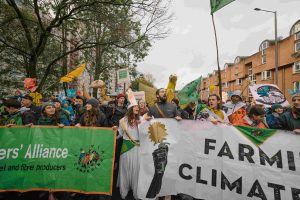Landworkers’ Alliance’s COP26 Coordinator, Roz Corbett, reflects on adversity, movement building and strengthening solidarity at COP26.
The climate talks in Glasgow are now over, and the outcomes of the official negotiations have once again failed to address both the scale and the nature of the climate crisis; not just for future generations, but for the survival of communities today. Some outcomes – such as those agreements coming out of Article 6 negotiations – may even end up exacerbating the climate crisis, with many certainly compromising various aspects of social and ecological justice.
And yet, we emerge from the process with our hope still burning.
The work in the run up to the COP was marred with uncertainty and the constantly changing processes brought about by the Covid pandemic. A constant flurry of ‘red list amendments’ and ‘Covid vaccine rule changes’ ended up having a huge impact on international participation in terms of resourcing and practical logistics. The flux also compounded a sense of confusion in our movement. Navigating all of this uncertainty was tiring, frustrating, and exclusionary. But it also served to clarify the important task of unifying the climate justice movement. Capitalism thrives in uncertainty; manoeuvring in the unknown to quickly overcome earthly limits. But it is not so easy for social movements to operate in this environment, and there are costs of doing so. By working cooperatively and collectively with organisations in the COP26 Coalition, La Via Campesina and other international allies, we were able not only to attend, but to resist and build.
Amidst this adversity and with support from allies, LWA was able to host fourteen international delegates from La Via Campesina, including members from Canada, Puerto Rico, France, Germany and Spain. I cannot express enough the joy it was (albeit laced with some anxiety!) to host one of the first LVC in-person international delegations since the pandemic began, and to witness the strength of spirit forged by us coming together and working in our movement spaces.
During the first week of the COP we also hosted a delegation of Zapatistas in Glasgow who shared the history of their struggle with us. They specifically did not want to engage in the COP, and instead wanted to reach out to movement activists in intimate spaces. It seemed strange to step back from logistical organising to sit for four hours and listen to the history of the Zapatista movement, told with bright eyes and a backdrop of embroidering fingers. To step back, slow down, and listen first hand about the longevity of the Zapatista struggle and how it is held fast by a clarity of vision and a deep determination was a timely reminder that our work for food sovereignty and climate justice is a long and hard journey, but one which is built on the solid foundations of our principles. We carry them with care and will be carried by them in return. Listening to the Zapatistas reaffirmed for me what it means to practice solidarity, and how to work with humility and open-heartedness with our mistakes in our journeys forward.
Every day during the COP, LWA together with our LVC allies worked both on the ‘inside’ and ‘outside’ of the official conference, observing dynamics of power and disrupting them on the inside, while building solidarity and hope for what can be achieved by grassroots organising on the outside. Our heavy work inside the conference was only made possible by the constant energy of movement-building outside. Walking out of the conference to the security gates and being met by the joyful energy of samba bands playing in the fading light of the day to a line of security guards, participating in actions that walked with red ribbons from the inside to be tied with red ribbons on the outside, and sharing daily analysis and experiences of negotiations workshops and actions in the movement assemblies; these were the events that sustained us.
The past fortnight since the COP ended has been a slow process of debriefing and reflection for our team. ‘What next?’, I have been asked, and have only been able to answer ‘rest’. Our work is hard and long, and beyond the capacity of any of us as individuals. We must all be able to say when it’s time to rest. So, we do not have all of the answers to this question of ‘what next?’ just yet. Some things are emerging, and emergent in our reflection. And some threads and edges were found in how our food sovereignty movement intersects with the wider climate justice.
The daily challenges of access during the COP raised the need for deep work on disability and ableism. Other conversations brought strong lessons in how to build legitimate and safe platforms and alliances for migrant agricultural workers within the climate justice movement. Ongoing conversations about animal agriculture and vegan diets aimed to ease some of the knots in our movement which we will continue to work on.
I can also happily say that we did celebrate and will continue to celebrate the friendships and connections we made and rekindled during the COP. And we all must give thanks to those who weren’t there, and those who couldn’t be there, but those who made it possible in other ways for us to articulate a strong voice.
The movement work during the COP created fertile ground for us all, those who were there, and those who weren’t.
Our movement continues to grow.


